Heating Without Electricity
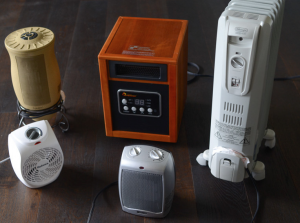
When living off grid a heating source that does not require electricity is a must….unless you have a super solar system that can accommodate a furnace. Keeping your living space warm during the winter months is an important part of living off grid.
Drolet Escape 1800 Wood Stove on Legs Large 2020 EPA Certified Wood Stove – 75,000 BTU – 2,100 sq.ft, Model DB03105
Living off grid we have a wood stove to heat the cabin, but there are those times that we have to go away and leave the place on its own, so we found it was time to look at alternate heating methods that do not require electricity.
An electric heater is by far the easiest portable heater to use, but with no electricity what are our options?
If the primary heat source for your off grid cabin is a wood stove, then it wouldn’t hurt to look at what else is out there as other means of heat. When it’s cold or maybe your not well you might want to be ready with a backup source of heat that runs on an alternative fuel source such as propane or kerosene.
From doing research, other than solar our options would be Propane or Kerosene, so what are the pros and cons or advantages and disadvantages of these types of heaters and what is available out there?
Pros and Cons of Propane and Kerosene heaters
PROS:
I think the biggest advantage would be that they work anywhere you want to have heat and both kerosene and propane are relatively inexpensive fuels. These sources of heat can be used to heat your off grid cabin or as a heat source when out camping. These clean burning heaters are an excellent temporary source of heat.
CONS:
These space heaters are said to be less safe than electric heaters, but that would be due to the fuel source being used. If you are using these heaters with small tanks they length of time they will run can be less than what your require, as an example a one pound propane tank on low may only last 4 hours.
The key is to use these heaters as directed and make sure if they are being used in side your off grid cabin for a long term heat source they should be installed and vented outside.
Types of Alternative Space Heaters
The two most common types of heaters other than electric would be gas and kerosene heaters. Gas heaters can use either natural gas or propane.
Propane (bottles) are available in many different sizes from very small (disposable tanks) to large tanks that can be delivered and refilled by big propane trucks. For an off-grid cabin or home your propane heater or heaters can be hooked up to these larger more permanent tanks, in this case your heating unit will be hooked up to the propane tank by a hose attachment and a regulator and would be a direct vent unit.
Heaters fuelled by kerosene burn slowly and very efficiently, one gallon of kerosene can last up to 16 hours, and I can tell you that is much longer than one of my wheelbarrows full of wood.
These heaters work very well, but if using inside be sure to use vented heaters as many portable heaters are ventless and using them inside can be dangerous by posing the risk of carbon monoxide poisoning. Now saying that many of the portable heaters now come with safety features such as automatic tip shut off, carbon monoxide detectors and low oxygen shut off. So if you are looking for a portable indoors heater make sure they have these safety features.
Pricing and Suggested Portable Heaters
In my research on what to help heat our Off Grid Cabin I have found many heaters both propane and kerosene that can help to heat the cabin. The prices seem to start around $99.00 and go upwards from there.
The portable heaters will heat a smaller area than a larger wall vented unit or a furnace, but it you are just wanting to heat up a small area or a couple rooms the portable heaters do a great job.
Propane Heater
The Mr. Heater F232050 MH9BX Portable Buddy Heater
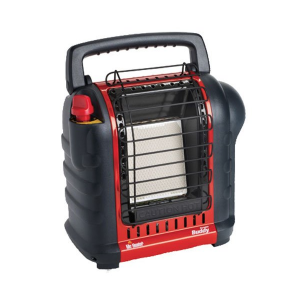 This propane heater is 4,000-9,000 BTU which will heat up an area of approximately 225 square feet.
This propane heater is 4,000-9,000 BTU which will heat up an area of approximately 225 square feet.
The Mr. Heater has a built in igniter with off and hi/lo heat settings with the following safety features:
- high temperature wire guard
- low-oxygen safety shut off (ODS)
- tip over safety shut off
This heater works great and puts out great heat, but it will go through a 1 lb propane tank in about 4 hours on low setting. It is recommended to have two extra bottles on hand.
This unit can also be hooked up to a 20 pound propane bottle and accessory hose, but when doing this be sure to ALWAYS turn the knob on the propane tank off first! It is important to do this in order for your heater to burn off all the propane left in the lines.
This unit sells for approximately 99.00 on Amazon
Kerosene Heater
KeroHeat Portable Radiant Kerosene Heater
This kerosene heater is 10,000 BTU which will heat up an area of approximately 1000 square feet, making this a great heater for your cabin.
The KeroHeat portable heater comes with an automatic igniter and easy flame adjuster. It comes with a siphon pump and the following safety features:
- high temperature wire guard
- automatic shut off switch
- tip over safety shut off
This heater works great and puts out great amount of heat, able to heat a large area.
The reviews on this unit have been good, the only thing I came across was the smell of kerosene, but most people say the smell is most prominent at start up and shut down.
1.2 gallons fo fuel will heat up to 14 hours.
These units can be purchased on Amazon for appox $170.00
There are other smaller cheaper versions available as well.
Direct Vent Heaters
If you are looking for a more permanent heating system that does not require electricity and you are not in a position just yet to install solar or are looking for a back up for when your away or an alternative. Then the direct vent heater is another option.
The direct vent heaters are safer than the portable as they are directly vented out of your home and hooked to a propane tank outside the home. The units are usually installed by gas fitters using copper tubing rather than rubber hoses.
Direct Vent Propane Wall Heater with Room Thermostat, Clean Gas Energy | Indoor Home, Office, Garage | Easy Installation
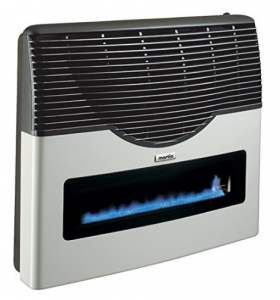
This unit comes in 3 sizes 8,000 BTU, 11,000 BTU and 20,000 BTU They are available with or without glass. The glass gives the unit that nice fireplace design.
These units are clean energy and economical as well as nice to look at.
The smaller 8,000 BTU unit will heap up to 200 Sq Ft were as the larger 20,000 BTU will heat up to 550 sq ft. So if you have a small cabin or off grid home you want to heat with propane, this is the ideal unit. Even for a larger 1000 sq ft cabin 2 of these units will nicely heat your home.
![]() Prices vary from about $800 for the smaller unit to $1100 for the larger one.
Prices vary from about $800 for the smaller unit to $1100 for the larger one.
These units are direct vent so they do require being connected to a propane tank, which requires a gas fitter.
This product is certified for use in the USA and Canada
Off all the units I think for our main cabin this will be our unit of choice. One for the basement and one for the main floor.
You may also be interested in a Rocket Heater – Here is a link to plans on how to build your own – Rocket Heater Plans
#camping #travel #vanlife #offgridliving #offgridcabinliving #offgridcabin #nature #hiking #bushcraft #nomad #wanderlust #naturephotography #sparring #homestead #survival #tinyhouse #apocalypse #tinyliving #roadtrip #outdoors #tinyhome #minimalism #naturelovers #sustainableliving #offthegrid #camp #travelholic #heatingwithouelectricity #offgridheaters #offgridheaing #solarheat #directventheater #propaneheater #kerosineheater
© 2017 – 2020, Teresa. All rights reserved.
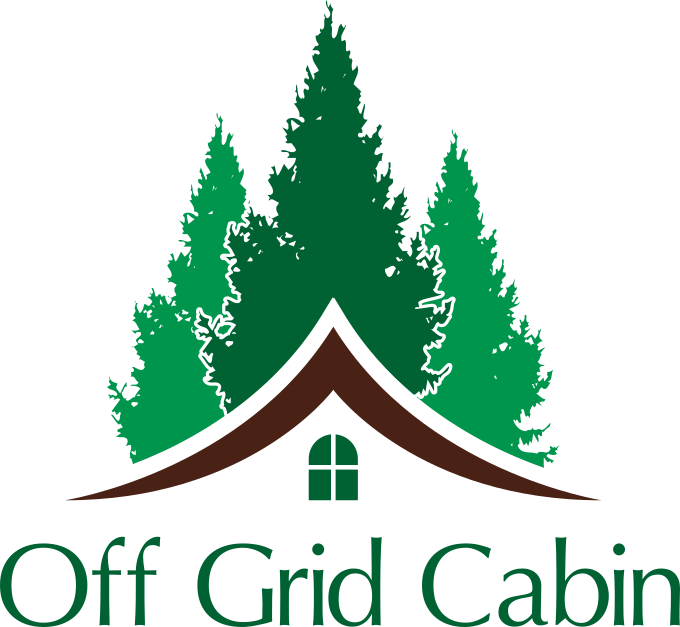

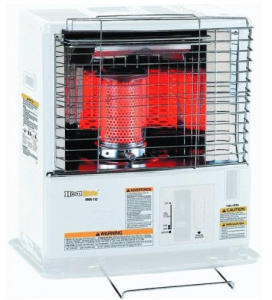
Wood is probably the best source of heat as you mentioned, but for other methods, you have a great list. We own a cabin and the only source of heat is wood so your post piqued my interest. I have been looking at other options as well.
I have a Mr. Buddy heater that we use when we go camping. I can’t say enough good things about it. Mr. Buddy is small but puts out a lot of heat, more than I was expecting. I have not tried a kerosene heater, but have heard other people are very fond of those too. Of course, if you can do it, solar is a great option. Thanks for sharing.
Our only heat source right now is wood as well, I love the wood heat but sometimes we are just up at the cabin for an afternoon so then we use the portable heater. The Mr. Buddy really does work well and like you say it’s great for camping so we take it along when we go away.
Great options! Now that winter is coming, we have an office attached to the garage that absolutely needs additional heat. It gets so cold in the winter, and it has enough electricity for my computer and some lights. The circuit won’t hold a big electric heater. I like the idea of installing a direct vent heater. Thanks for the review.
Hi JB. For your garage office the direct vent heater would work well. Let us know how it works for you.
Hello. Very interesting article, indeed. Although I prefer solar, this selection of heaters is impressive. Right away, I fell in love with the Mr. Heater Portable Buddy Heater. First of all, the smell of the heat is not kerosene. Secondly, it is portable and could be carried from room to room, if that became necessary. Also, the added features like the low oxygen safety and tip over safety shut offs are great for the price.
Thank you for helping me make a great decision.
.Maxine
I really like the Mr. Heater Buddy Heater as well. I have used it and find it is everything I wanted.
Thanks for the review. There is a lot there I wasn’t up to date on. I recall from childhood in the fifties the gas and propane heaters we used. I always thought of them as dangerous, particularly with animals and kids near open flames and the possibility of accidents knocking them over. I see for the most parts these weaknesses have been overcome. Also, I’ve had a fear of kerosene when a woman I knew in Senegal caught on fire and died from the kerosene refrigerator in her home. Also, in addition to the potential of carbon monoxide poisoning from kerosene, there is the unpleasant smell from the fuel, itself, and of course the dangerous smoke. I think I lean more toward the clean burning gas solutions.
Best regards,
Joe
That is terrible about the women you knew. I would be fearing Kerosene as well. I do agree with you that a cleaner gas is much better, especially when burning in a cabin or home. Thanks for your comments
Hey
My name is Willem, living on a wooden classic sailboat for 10 years now.
Needed a heater and did not want to depend on electrics.
Not satisfied with brand diesel heaters I started to apply alterations and after a few years, I unintentionally had developed a new diesel heater having full low combustion, no odors and barely soot buildup.
In my opinion ideal for an off-grid cabin aswell.
In case you are interested to find out more feel free to contact me.
Norskblueflamme.com
Hi. I’m here in Ontario Canada living in my first tiny home but need a more proper heater.
Hi, congratulations on your tiny home. I’m not sure if you have electric, gas or propane, but many gas heaters can be used with propane by changing the orifice – be sure to check with your supplier first though.
Here is a great direct vent heater Check out this DIRECT VENT HEATER
Hi Im Laurie. I am building a shed to home. 200sq.ft. off grid. Wood stoves take up to much space. Although I not only heat with it but cook on it. I work nights so need heat for while Im at work. It gets really cold in the winter here. And I have birds and dogs that need to be kept warmed up at night. I have been looking for an alternative way to heat without taking up all my space. Definitely thinking the vented gas heater would be great.
I really like the gas heater. We have recently installed one and it works very well.